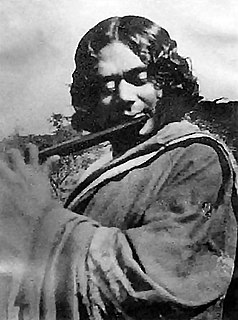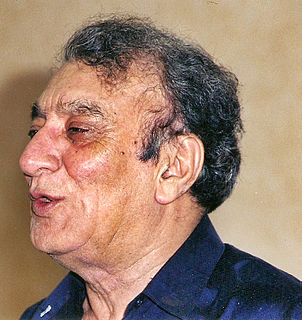The Booker Prize, formerly known as the Booker Prize for Fiction (1969–2001) and the Man Booker Prize (2002–2019), is a literary prize awarded each year for the best novel written in English and published in the United Kingdom or Ireland. The winner of the Booker Prize is generally assured international renown and success; therefore, the prize is of great significance for the book trade. From its inception, only novels written by Commonwealth, Irish, and South African citizens were eligible to receive the prize; in 2014 it was widened to any English-language novel—a change that proved controversial.
The Hopwood Awards are a major scholarship program at the University of Michigan, founded by Avery Hopwood.

Kazi Nazrul Islam was a Bengali poet, writer, musician and the national poet of Bangladesh. Popularly known as Nazrul, he produced a large body of poetry and music with themes that included religious devotion and rebellion against oppression. Nazrul's activism for political and social justice earned him the title of "Bidrohi Kobi". His compositions form the avant-garde music genre of Nazrul Geeti.

Lambda Literary Awards, also known as the "Lammys", are awarded yearly by the U.S.-based Lambda Literary Foundation to published works which celebrate or explore LGBT themes. Categories include Humor, Romance and Biography. To qualify, a book must have been published in the United States in the year current to the award. The Lambda Literary Foundation states that its mission is "to celebrate LGBT literature and provide resources for writers, readers, booksellers, publishers, and librarians – the whole literary community." The awards were instituted in 1988.
Ahmed Ali was a Pakistani novelist, poet, critic, translator, diplomat and scholar. A pioneer of the modem Urdu short story, his works include the short story collections: Angaare (Embers), 1932; Hamari Gali, 1940; Qaid Khana, 1942; and Maut Se Pehle, 1945. His other writings include Twilight in Delhi (1940), his first novel in the English language.

Syed Ahmad Shah, better known by his pen name Ahmed Faraz, was a Pakistani Urdu poet, scriptwriter and chairman of Pakistan Academy of Letters. He wrote his poetry under pseudonym Faraz. During his lifetime, he criticised military rule and coup d'état in the country and was displaced by the military dictators. He was awarded the Sitara-i-Imtiaz and Hilal-e-Imtiaz. On 25 August 2008, he died in Islamabad, and later Government of Pakistan conferred Hilal-e-Pakistan posthumously upon Faraz for his contribution to poetry and Urdu literature.

Rizwan Ahmed, also known as Riz MC, is a British actor, rapper, and activist. As an actor, he has won a Primetime Emmy Award and has received nominations for a Golden Globe and three British Independent Film Awards. He was initially known for his work in independent films such as The Road to Guantanamo (2006), Shifty (2008), Four Lions (2010), Trishna (2011), Ill Manors (2012), and The Reluctant Fundamentalist (2013), as well as television series such as Britz (2007) and Dead Set (2008), before his breakout role in the film Nightcrawler (2014).

For the author of Gentleman Bismillah, see Colonel Ashfaq Hussain
Tahmima Anam is a Bangladeshi-born British writer, novelist and columnist. Her first novel, A Golden Age (2007), was the Best First Book winner of the 2008 Commonwealth Writers' Prizes. Her follow-up novel, The Good Muslim, was nominated for the 2011 Man Asian Literary Prize. She is the granddaughter of Abul Mansur Ahmed and daughter of Mahfuz Anam.
The Butterfly Hunter is the unpublished debut novel by Birmingham-based British writer Dr. Max Malik, which has drawn comparisons with Salman Rushdie's controversial work The Satanic Verses. The Butterfly Hunter was completed in 2008, and submitted by the author to the Muslim Writers Awards in 2008, as an entry in the Novel category. The author was winner of the Muslim Writer of the Year Award in 2007, and the organisers of the Awards project described his 2008 submission as "one of the best" received. The Butterfly Hunter was a shortlisted nominee in the Novel category of the Muslim Writers Awards in 2008, along with four other works. However, the book was never submitted to the independent judging panel tasked with adjudicating competition entries.

Bernardine Anne Mobolaji Evaristo, OBE, FRSL, FRSA, FEA, is a British author. Her eighth book, the novel, Girl, Woman, Other, won the Booker Prize in 2019, making her the first black woman and the first black British person to win it. In 2020 she won the British Book Awards: Fiction Book of the Year and Author of the Year, as well as the Indie Book Award for Fiction. The novel was one of Barack Obama's 19 Favourite Books of 2019 and Roxane Gay's Favourite Book of 2019. In June 2020 she became the first woman of colour and the first black British writer to get to number 1 in the UK paperback fiction charts, where she held the top spot for five weeks. The novel is currently being translated into 35 languages. Evaristo's writing also includes short fiction, drama, poetry, essays, literary criticism, and projects for stage and radio. Two of her books, The Emperor's Babe (2001) and Hello Mum (2010), have been adapted into BBC Radio 4 dramas. She is Professor of Creative Writing at Brunel University London, one of fewer than 30 black female professors out of around 20,000 professors overall. She was Vice-Chair of the Royal Society of Literature until 2020 when she became a lifetime Vice President. She was also elected a lifetime Honorary Fellow of St Anne's College, University of Oxford in 2020.

Patrick Ness is a British-American author, journalist, lecturer and screenwriter. Born in the United States, Ness moved to London and holds dual citizenship. He is best known for his books for young adults, including the Chaos Walking trilogy and A Monster Calls.
Islamic fiction is a genre of fiction. Islamic fiction works expound and illustrate an Islamic world view, put forth some explicit Islamic lessons in their plot and characterizations, or serve to make Muslims visible. Islamic fiction is different than Muslim fiction, which may refer to any and all works of fiction produced by Muslims.

Muslim Power 100 is a 2007 list published by The Power 100 website compiled of the top 100 British Muslims who have contributed positively to the United Kingdom.

British Muslim Awards is an annual award ceremony that honours the success and achievements of Britain's Muslim individuals, groups and businesses. It was established in 2013.









